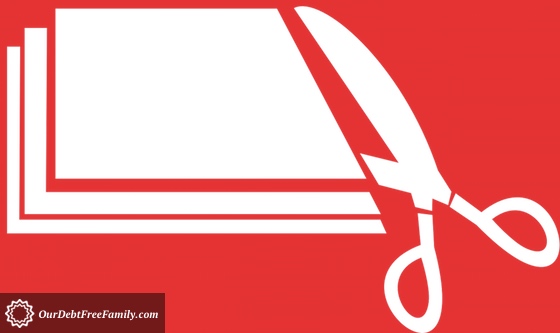Mike (my husband) and I had the honor of being interviewed on the His and Her Money Podcast recently! In the interview, we shared the steps we took to pay off more than $85,000 of debt in 20 months.
This prompted the following question from Heather on Facebook:
“Hi there!!! I just listened to your podcast on His and Her Money. I would love for you to discuss how to first get current on our bills, then come up with a budget, and then pay off our debt… So most importantly, how to get ready to pay off debt… We are currently living paycheck to paycheck, and we are behind on some bills…. So obviously we can’t pay extra on debt when we aren’t even paying our current bills! Thanks for your help!”
– Heather
This is such a great question because I know so many people are in this exact situation.
In fact, before Mike and I got together, my finances were in the same state.
I was in over my head with credit card debt, and my paycheck just didn’t cover all of my payments each month.
Most of my credit cards were maxed out, my student loans were in forbearance, and my checking account was frequently overdrawn. Every now and then my cell phone would get disconnected, which was embarrassing to tell my friends why they couldn’t get ahold of me.
I felt like I was on an endless cycle of covering my most past due bills while letting my more current bills slide.
It was terrible.
It was stressful.
It was depressing.
So in this installment of Monica’s Two Cents, I’ll give you the advice I wish I would have received for getting current on your bills first so that you can then pay off your debt and work toward true financial freedom.
If you have a question for me, I would love to help! Fill out the form on the Contact page or send me a message via Facebook.
Let’s jump in!

Follow these steps to get current on your bills
Before you follow the steps I’ve laid out below, make sure you’ve done these two things first, and if you’re single, read this post.
Once you’re ready to take control, open a blank spreadsheet on your computer or take out a notepad. It’s time to get a clear look at your financial situation and take action.
Subscribe below and get a FREE Monthly Budget Template!
-
Get organized —
Begin tracking your spending so you know where your money is going. Then write down all of your bills, including utilities, mortgage or rent, and debt. List the payment amounts and payment due dates.
-
Create your debt snowball —
This is your debt payoff plan where you list your debts by balance from smallest to largest. Add a section for the bills that are past due. List these in order of the past due amounts, smallest to largest, but prioritize the most urgent bills. For example, if you’ve received a letter that your electricity will be turned off if not paid within 10 days, this would take priority over a credit card bill that is past due 30 days
-
Get on a monthly budget —
I’ve previously written about why you should have a monthly budget, and I’ve also provided step-by-step instructions for creating your monthly budget with a free download of my budget spreadsheet.
This is not a set-it-and-forget-it part of the process. You’ll create a new budget each month to account for your changing needs and expenses.

-
Communicate with your creditors —
Call your past due accounts and explain that you are getting on a plan to get caught up. They may be willing to work with you if they know you plan to pay them.
But make sure you get any settlement agreements in writing before you send them a check. And never give them your bank account information.
-
Cut expenses —
In my post about 20 expenses you can cut from your budget, I list several ideas that may be considered drastic, (including kids activities and internet) and I’ll admit that my husband and I haven’t cut all of them. But if you are behind on your bills, then it’s time to take a hard look at where your money is going. Examine your budget and cut whatever isn’t a true necessity. Here is a link to my posting if you need some ideas.
Once you’re current on your bills, you can re-evaluate your budget to see if there’s room to add a few things back in if you’re still able to work toward your financial goals.

-
Reduce your spending —
Once you’ve cut what you can in your budget, try to come up with creative ways to trim your spending in other areas. I’ve come up with 28 simple ways to trim your spending, and I’ve recently written about how we cut our grocery spending in half since January. Take a peek at my ideas and see what will work for your situation. Then add a few more ideas of your own.
Set a goal of reducing your grocery spending by $20 or your electric bill by 10% next month. Use the money you free up from cutting expenses and reducing your spending to get current on your bills.
-
Boost your income —
Lastly, get creative and come up with ways to boost your income. I’ve shared my best tips for hosting a successful garage sale and other ways to sell your stuff. For example, one great way to sell your stuff is to buy inexpensive items at garage sales and sell them on eBay for a profit as a fun way to boost his income while he paid off his debt.
What can you do to generate some extra income? Can you babysit for a neighbor? Walk someone’s dog? Mow some lawns? Are you crafty? If so, try selling some of your creations on Etsy or Amazon.
Eventually, through consistent action and dedication to my goal, I was able to get current on my bills, and I successfully paid off all of my credit card debt before Mike and I got engaged.
After I paid off my credit card debt, I vowed never to put myself in that situation again.
Being behind on bills has to be one of the most stressful experiences to go through in life, but there is a way out.
It’s up to you to determine the root of the problem so that you can resolve it and change the course of your financial future forever.
For some people, it’s a spending problem. For others, it’s an income problem.
For me, it was a little of both.
Take action today, and I’m sure that you’ll be able to turn your situation around in no time.
Where To Now?
Finally, if you’re reading this because you have debt and eliminating small things from your budget just won’t cut it, consider refinancing. There have been a number of good fintech companies moving into the personal loans market recently. One legitimate company I like is Social Finance (SoFi). If you have debt with 10% interest or higher, they might be able to give you a better rate.
My Most Popular Articles Are Below
Find Out How Ron and Thu Paid Off $137,000 in 7 Years
Learn How Lauren Greutman Paid Off $40,000 of Debt
Make Passive Income With Paribus
Yes, You Can Pay off $200,000 in Debt in 7 Years
Leave a Reply